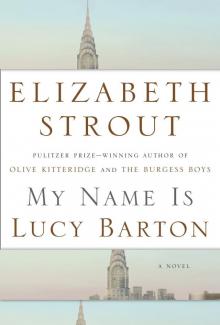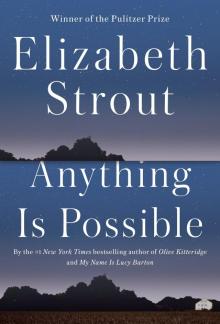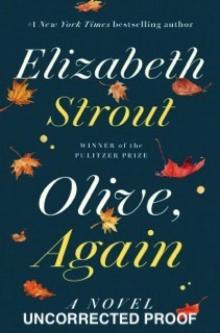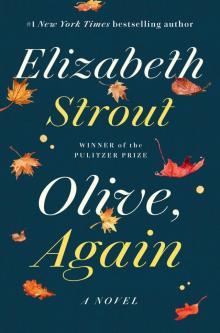- Home
- Elizabeth Strout
Olive, Again Page 6
Olive, Again Read online
Page 6
* * *
One day when Kayley’s father was very sick, he had motioned to her from where he lay on his bed, and Kayley had gone and put her ear to his mouth, and he said, “You’ve always been my favorite child.” After a moment he added, “Your mother’s favorite is Brenda.” His lips had a white gumminess in the corners.
“I love you, Daddy,” Kayley said; with a tissue, she wiped his lips carefully, and her father looked at her with warmth in his eyes.
But she thought about this often, the fact that her father had said she was his favorite child. And she thought about her mother, who had always been a distracted woman and who worked part-time now at a dental office in town; it seemed she had little to say to Kayley in the evenings, and often Kayley’s feelings were hurt by this; Kayley could actually feel a small wave of pain go through her chest at times, and she would think: This is why they say a person’s feelings are hurt, because they do hurt.
* * *
The next week that Kayley worked at the Ringrose house she felt that same feeling she always got in their house, a stark feeling of dismalness. The day was tremendously sunny, the light poured through the windows of the living room, and after Kayley had washed the logs in the fireplace she sat down on the couch with the upholstery that was stiff and hard.
A strong sensual impulse suddenly went through her, as though the chasteness of the house was screaming for her. She sat there as the feeling grew, and after a moment she slowly undid the first button on her blouse and put her hand down under her bra and felt her breast and a glow went through her. She closed her eyes and undid the second button of her blouse and pulled her breast from the cup of her bra. In the stillness of the house her breast seemed vulnerable and alive to her; she touched her fingers to her mouth and then back to her breast and she kept touching her breast, filled with unbelievable sensations. She sat with her eyes closed, touching her breast, feeling the air touching it as well—it was oddly thrilling, doing this in the strangeness and silence of the Ringrose home.
A small sound made her eyes open, and in the doorway of the living room stood Mr. Ringrose. Kayley sat up straight and tried to close her blouse; her cheeks became flaming hot. The man was tall and he stood there watching her behind his glasses, not smiling. Without saying anything Mr. Ringrose gave the tiniest nod, and in the blurriness of the moment Kayley somehow understood he wanted her to continue. She stared at him and then said—or tried to say—“No,” but he spoke first, and his voice was thick. “Go on.” She shook her head, but he kept watching her, and a kind expression appeared on his face. “Go on,” he said again, quietly. She stared at him, she was tremendously frightened. And he seemed to know it, because his expression of kindness grew; he tilted his head slightly down. He said quietly, “Please go on.” They watched each other, and his eyes—he wore large rimless glasses—seemed kind and oddly harmless, and so in a moment she closed her eyes and touched her breast again. When she opened her eyes, he was gone.
She buttoned her blouse hurriedly and stood up; she finished her dusting with her cheeks still hot; she felt a breathlessness as she went about the place, washing the floor on her hands and knees. Her mind kept thinking: Oh my God, oh my God, oh my God.
She almost didn’t see it as she was leaving, the envelope on the mat by the front door as she left the house, and then bending down she saw that it had her last name on it. She took the envelope, and when she turned the corner she opened it and found three twenty-dollar bills.
Now Kayley felt a different fear. She stuck the money in her back pocket, still in the envelope, and rode her bicycle far out of town. “Oh my God, oh my God,” she kept saying.
When she came home, her mother said, “Where were you?” Kayley said she had been riding her bike after cleaning for the Ringroses; it was such a gorgeous day. And then Kayley sat down at the piano and began to play—oh, how she played! She went through the sonatas of Mozart as though she could not dig her fingers deep enough into the fresh soil of the music; she played and played.
As they sat eating supper, her mother said, “You’ve barely touched that piano since your father died, and it’s sitting right there taking up all that space.”
Kayley said, “I’ll keep playing. Please don’t get rid of it.”
* * *
The next week it was raining and Kayley rode her bike to the Ringrose house with her raincoat on and her hood over her head, but she was still dripping wet when she got there, and again there was no sign of either of them. She dried herself as best she could with a towel from the kitchen and went to work, getting the pail with the cleaning fluid for the logs, and as she was kneeling and running a cloth over the logs in the fireplace—there must have been a sound—she looked up; Mr. Ringrose was standing exactly where he had been standing the time before. A few raindrops were on the shoulders of his pale blue shirt, and also on his glasses, but she could still see his eyes. He simply stood there looking at her, and she did not speak. After a moment he gave her the tiniest nod, and she sat back on her heels and put her hand over her breast and he nodded the tiny nod again, and after another moment Kayley slowly stood, drying her hands on her jeans, and she went and sat back on the stiff couch, and she undid her blouse, this time watching him. For Kayley there was a sense of unreality to it as she took her blouse off slowly, then took her bra off, and the air in the room seemed to leap at her bare breasts, and the rain outside beat down on the windows. The man said in a low voice, “Thank you.”
On the mat by the front door was once again the envelope filled with cash.
* * *
When Kayley was very young she had asked her mother one day if she was pretty, and her mother said, “Well, you’re not going to win any beauty contests, but you’re not going to be in a freak show either.”
In fact, not long before her father died, Kayley—she was in the sixth grade then—was asked to be in a beauty contest. Her gym teacher called her aside and asked if she would take part in the Little Miss Moxie competition in the town of Shirley Falls; Kayley’s father was furious. “No daughter of mine will be judged on how she looks!” He was really angry about it, and so Kayley told her teacher no, she couldn’t do it, and Kayley didn’t care about it one way or another.
Yet these days she would stare at herself in the mirror in her bedroom, turning her head one way, then another. She thought—some nights she thought this—that she might be pretty. She did not take her shirt and bra off in front of the mirror to see what Mr. Ringrose saw. That was not something she could do, but she thought about the man almost constantly.
* * *
June arrived. School would be over in two weeks.
In the activities room of the Congregational church, Kayley sat on the piano bench dressed in Mrs. Ringrose’s wedding dress. It was an unseasonably hot day, and a big fan stood nearby squeaking slightly as it twirled the air around. Folded chairs were set up with an aisle between them, and the old wooden floor creaked as women walked across it, settling themselves into the chairs. Through the windows a bright blue sky could be seen, and also part of the parking lot. Every week for nine weeks now, Kayley had taken her blouse off for Mr. Ringrose—one time only he did not show up, and Kayley felt bereft—and the cash-filled envelopes, which she had stuffed in the bureau drawer beneath her underpants and socks, had become so much she had taken them and hidden them in her closet. It was odd, because sometimes there was sixty dollars, and a few times there was just a ten and a few ones, and once there were two twenties.
As Kayley sat on the piano bench, she watched Mrs. Ringrose walking around the activities room and thought: Your husband has seen my breasts and I’ll bet you he hasn’t seen yours in years! This thought made her extremely happy. Mrs. Ringrose finally gave her the nod, and Kayley began to play “Pomp and Circumstance,” and the first woman who was in the Silver Squares fashion show walked down the little aisle between the folding chairs, wearing a long dress and a whi
te cap over her gray-haired head; Mrs. Ringrose stood in the front of the room and said, “The first Pilgrims, 1620.” Perhaps fifteen old women sat in the chairs that were set up for fifty, and Kayley kept playing as Mrs. Ringrose stood behind a lectern and said who each person was, and what period of time it was about whatever they were wearing.
Bertha Babcock came last; she wore an orange pantsuit. “The modern era,” Mrs. Ringrose said, and they all clapped lightly.
Afterward the women sat on the folding chairs eating cookies with thin paper napkins on their laps. No one spoke to Kayley, and so in a while she went and changed out of the wedding gown and put it on the table in the front of the room, then she rode her bicycle home.
* * *
Christine Labbe stared at her from her blue-made-up eyes, then burst out laughing. “How nauseating,” she said, and she laughed and laughed, coughing, bending over.
“It was,” Kayley said. “It was just so stupid.”
“You think?” And Christine coughed again and said, “Jesus mother of Mary, Kayley. What a stupid fucking thing. She’s retiring this year, you know.”
Kayley said she didn’t know. She gazed at a truck parked nearby; it had a bumper sticker on it that said: REDNECKS NEEDED. FRECKLES OKAY.
“Oh yeah. The student council was getting all weepy about it, and they’re going to present her with a lilac bush on the last day of school.” Christine rolled her eyes.
“Who cares. I don’t care, that’s for sure,” Kayley said.
* * *
At home these nights Kayley played the piano; she played and played, and she became good at it again. Up and down the keyboard her fingers flew.
* * *
At the nursing home, Miss Minnie sat slumped over a tray table, her head resting on her arms, her eyes closed. “Miss Minnie?” Kayley whispered, leaning toward the old woman. “Miss Minnie?” But the old woman did not respond; she did not move, or open her eyes. She had been like this—exactly like this—the last two times Kayley had ridden her bike out to the nursing home. The same aide came in, in her blue uniform, and she stood with her hands on her hips, watching Miss Minnie.
“Oh, honey,” she finally said to Kayley. “She’s just real old, and real depressed.”
Kayley leaned down toward Miss Minnie, and she spoke quietly into her ear, feeling the woman’s fine hair against her mouth. “Miss Minnie, it’s me, Kayley. Listen, Miss Minnie?” And then Kayley said, “I love you.” And the woman did not move.
The next time Kayley visited, Miss Minnie’s room was empty—completely empty, no bed, no chair—and there were two women in it cleaning with mops. “Wait!” Kayley said, but they just kept swirling their mops, and when Kayley went to the front desk, the woman there said, “I’m sorry. We didn’t have your number or we would have called.”
That night, Kayley’s mother only shrugged and said, “Well, it was bound to occur.”
“But what happened to the picture of her brother, and her violets?”
Her mother said, “I imagine they got tossed out.”
Kayley waited long enough so that her mother would not think she wanted to get away from her, but after some time passed Kayley said, “Mom, I want to go for a bike ride. The evenings are light now,” and her mother looked at her suspiciously. Kayley could not ride fast enough, up Dyer Road, then down Elm Street, and then up past the school, she just could not ride her bike fast enough.
* * *
When Mr. Ringrose showed up the next week, silently as always, Kayley was dusting the legs of the couch. She turned; she was enormously glad to see him. “Hello,” she whispered as she stood up. It was the first time she had spoken to him. He nodded and gave her a tiny smile, gazing at her through his rimless glasses. She unbuttoned her shirt without pause. She thought his eyes seemed even kinder than usual and she watched him steadily as she moistened her fingers and touched her breasts, the tips becoming hard almost instantly; if Mrs. Ringrose should walk in, she didn’t care! This is how Kayley felt that day as she turned slightly one way, then the other, for the silent Mr. Ringrose.
She put the envelope of money inside her underwear drawer, and the next three weeks she did the same; she was astonished that one week there was a hundred-dollar bill.
* * *
School was now out, and on Wednesday mornings and Saturday mornings, Kayley worked at the doughnut shop. She poured coffee and brought out the doughnuts from the back, slipping them into the white paper bags for the customers. One Wednesday she saw Mr. Ringrose walking by the place; he was glancing down at the sidewalk and did not look up through the window. He was slightly bent over, and she almost did not recognize him at first; his white hair was sticking at odd angles from his head. She stopped in the middle of an order to watch him; he seemed to not walk in a straight line. It could not be him, she decided. But she was rattled. No, that could not have been him.
When she cleaned the Ringrose house the next week, he did not show up, and she felt terribly sad and worried.
That Saturday, as the sun was slicing through the large glass windows of the doughnut shop, Mrs. Kitteridge walked in. “Oh, Mrs. Kitteridge,” Kayley said; she was surprised at how glad she was to see her. But Mrs. Kitteridge looked at her and said, “Do I know you?” And Kayley blushed.
“I’m the Callaghan—”
“Oh, wait. Of course. I remember you, riding your bicycle to that awful nursing home to visit that woman.”
Kayley said, “Do you still visit your friend there? My friend died.”
Mrs. Kitteridge looked her up and down. “I’m sorry about that,” she said. Then she added, “Well, not that she’s dead, who wouldn’t want to be dead living in there. Damn smart of her to die. My friend is still alive.”
“Oh, I’m sorry,” Kayley said.
Mrs. Kitteridge ordered three plain doughnuts and two cups of coffee, and she turned to the man behind her. “Jack,” she said, “say hello to the Callaghan girl.” The man stepped forward; he was a big person as well, wearing aviator sunglasses and a short-sleeved shirt that showed his saggy arms, and Kayley did not really like the way he said “Hello, Callaghan girl” as though he was slightly mocking her.
“Bye now,” Mrs. Kitteridge said, and they walked out, Mrs. Kitteridge waving a hand above her head.
* * *
A few evenings later, the telephone rang in their apartment, and Kayley’s mother answered and said, “Yes, of course. Here she is.”
Kayley had been playing the piano—ferociously she had been playing it, but she had stopped when the telephone rang—and now, when her mother said “It’s for you,” Kayley rose and went to the phone.
“Kayley? This is Mrs. Ringrose.”
Kayley opened her mouth but no sound came out.
“I won’t be needing you anymore,” said Mrs. Ringrose. There was a silence after that.
“Oh, I—” Kayley started to say.
“There are a few health issues in our house, and I’ve retired, as I’m sure you know. So I can take care of things. Thank you, Kayley. Goodbye.”
* * *
A wave of grief scooped Kayley up, and it would not let her go. She rode her bicycle through town, down along the coast, she rode and rode, thinking of Mr. Ringrose. There was no one she could tell about what had happened, and this knowledge stayed in her and made her feel almost constantly unwell. But she simply kept going, riding her bicycle, working at the doughnut shop two mornings a week, and the man who ran the place let her add another morning, Thursdays. But she was a devastated girl, and one afternoon as she knelt on Bertha Babcock’s kitchen floor with the toothbrush, she felt a real dizziness. Bertha Babcock was not home, and Kayley stood up and she left the woman a note. I CAN’T WORK HERE ANYMORE. She did not even empty the pail of water, and she left the toothbrush on the floor.
The next day, her mother came into the doughnut shop and said t
o Kayley, “You come straight home after work.” Her mother looked awful, furious and small-eyed. When Kayley got home, her mother was standing in her room. Kayley’s underwear and socks had been flung onto her bed, the bureau drawer stuck open like a tongue. “Where did you get this money?” Her mother screamed the words at her, and showed her the envelopes with the twenty-dollar bills and the one envelope with the hundred-dollar bill. Her mother took the money out and let it fly around the room as she tossed it in the air. “Tell me where you got this!”
“It’s my house cleaning money,” Kayley said.
“No it is not! You got ten dollars to clean house for that Ringrose woman, and there’s at least three hundred dollars here, where did it come from?”
“Mom, I’ve been cleaning for her for ages.”
“Don’t you lie to me!” Her mother’s fury was huge, billowing through the room.
Kayley’s mind worked quickly; she did the math even as her mother screamed; the other stuffed envelopes of cash were hidden in her closet, and she did not let her eyes look in that direction. Instead, she sat down on the bed and said, making her voice sound calm, “It’s my house cleaning money, Mom. From Bertha Babcock, who pays me fifteen dollars, so that’s twenty-five dollars a week.” She added, “And I went to the bank to get a hundred-dollar bill so I could have it.”
“You’re lying,” her mother said. “Bertha Babcock called here this morning and told me you just walked out.” Kayley did not answer this. “Who taught you that you could just walk out of a job like that? Who taught you such a thing?”

 The Best American Short Stories 2013
The Best American Short Stories 2013 Abide With Me
Abide With Me My Name Is Lucy Barton
My Name Is Lucy Barton Olive Kitteridge
Olive Kitteridge Anything Is Possible
Anything Is Possible Olive, Again (ARC)
Olive, Again (ARC) Olive, Again
Olive, Again